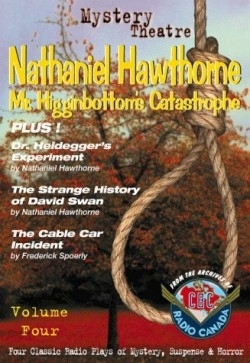
Mystery Theatre
Mr. Higginbottom?s Catastrophe Dr. Heidegger?s Experiment The Strange History of David Swann The Cable Car Incident
Radio has been relegated to such background status today that it’s difficult to imagine how people once gathered around it so expectantly. The four classics, three by Nathaniel Hawthorne, from the archives of the Canadian Broadcasting Corporation, however, will make listeners long for those days.
Billed as “four classic radio plays of mystery, suspense and horror,” the plays do not rely on modern-day definitions of those genres, such as placing pauses in between episodes of violence. Instead, they draw upon the capacity of the human mind to seize upon and obsess over an idea, which leads to shocking results that are also often pitiful. Since pity is one of the most horrible emotions to experience, either for oneself or on another’s behalf, the classification of the plays as horror is appropriate.
The best is Frederick Spoerly’s “The Cable Car Incident.” It is a story of two friends who board a cable car-one reluctantly and only at the other’s urging-who then are led to believe that the cable will break unless one of them jumps. As they argue whether one should jump, and if so, who, the two debate the standards by which life’s value should be measured. They can’t agree. What’s worse, however, is that the one who holds that family and fatherhood is more important than career and economic success doesn’t seem to believe his own argument.
Nathaniel Hawthorne’s “Dr. Heidegger’s Experiment” is a close second to “The Cable Car Incident.” After drinking from the Fountain of Youth, three acquaintances discover that the joy of recapturing youth quickly deteriorates as they bicker over events that maturity and wisdom would deem better left untouched. As the water’s effect passes, they find themselves less satisfied than before with their lives; another sad, pitiful fact to face.
Since radio plays are so rare now-all four plays were originally broadcast in the late 1960s-the format is somewhat hard to grasp at first. “Dr. Heidegger’s Experiment” is the most difficult to understand, as the characters speak with pronounced accents and inflections. Listening a second time is advisable in order to appreciate some of the more subtle lines and witticisms.
All four are thoroughly absorbing, entertaining and thought-provoking.
Reviewed by
Cari Noga
Disclosure: This article is not an endorsement, but a review. The publisher of this book provided free copies of the book to have their book reviewed by a professional reviewer. No fee was paid by the publisher for this review. Foreword Reviews only recommends books that we love. Foreword Magazine, Inc. is disclosing this in accordance with the Federal Trade Commission’s 16 CFR, Part 255.
